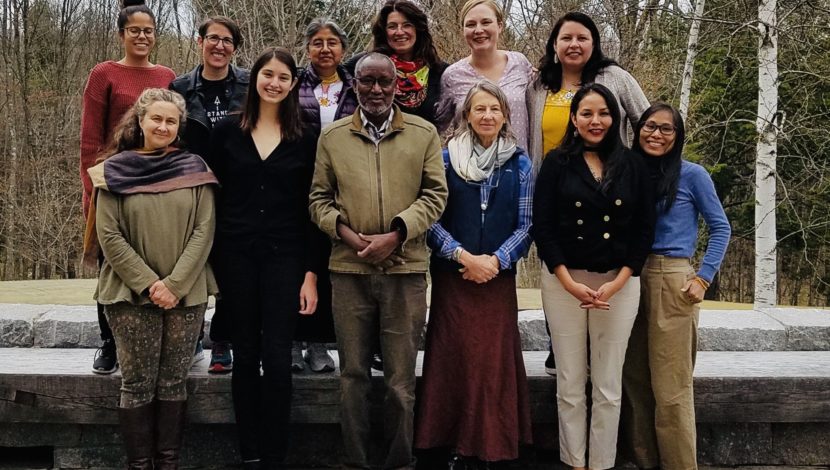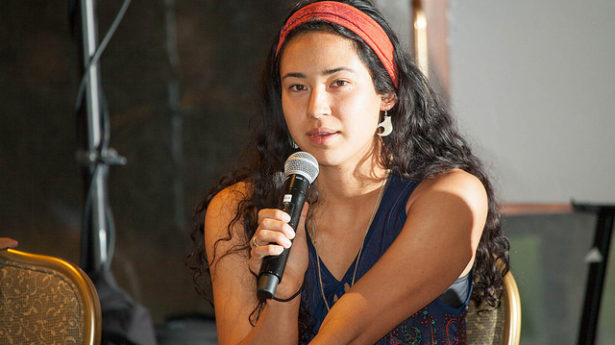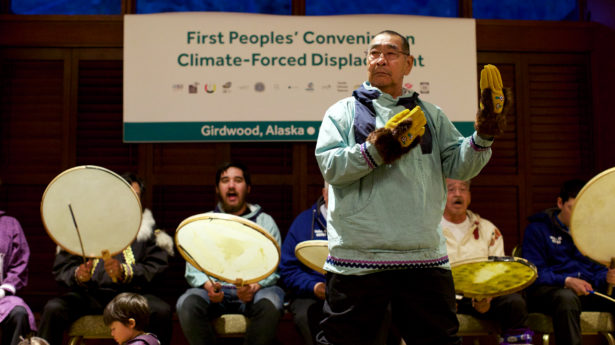The Unitarian Universalist Service Committee advances human rights through grassroots collaborations.
Lessons in Listening: Guidance from Indigenous Leaders

By on May 13, 2019
The recent release of the grave UN assessment detailing the impact of humans on the earth’s ecosystem is another reminder that, unless we change course, humans – along with one million other species – are speeding toward extinction. We need to find better ways of co-existing with nature that are based in regenerative practices, not extraction.
UUSC’s Climate-Forced Displacement Initiative centers the voices of First and Indigenous Peoples, in part because they are disproportionately impacted by climate change, but also because we recognize their leadership in how to live in closer harmony with Mother Earth. For too long, those of us from Western countries have been part of a system that perpetuates violence towards people and the environment. It’s time we course correct and listen to the first stewards of the earth.
In this spirit, I recently participated in the International Funders of Indigenous Peoples’ (IFIP’s) Learning Institute. Set in a tranquil retreat center in the forests of New Hampshire, a small group of us who fund or work alongside indigenous communities, met with a distinguished faculty of indigenous leaders from Ecuador, Kenya, and the United States, to listen and learn. Given the trauma of colonization and government and corporate policies and practices that harm indigenous people, we came together because we have a lot to learn to ensure that our relationships are not extractive, that we don’t in any way reinforce systems of oppression, and that we follow UUSC’s model of listening to those most affected and align our work to follow their lead.
During our time together, we heard stories of hope and inspiration as the leaders before us displayed their ecological wisdom and profound resilience in the face of significant and ongoing oppression. We heard about the role of indigenous women in caring for the community, including lessons for the feminist movement. This was coupled with accounts of displacement, including those resulting from “false solutions” to the climate crisis, like a wind farm in Kenya that has displaced hundreds of indigenous people, offering a cautionary tale of backing fossil fuel alternatives without consideration of their non-climate impacts. We also heard first-hand accounts of how climate change is altering long-held traditional practices to predict weather and farming practices in Kenya and how environmental racism has left Native Communities in the Southwestern United States with high rates of cancer, birth defects, and the loss of loved ones after exposure to high levels of uranium. The history of violation is long and the pain is real.
This history provided the context for us to then drill down on specific ways to support indigenous leaders in addressing climate change—the need for indigenous people to be at the table when decisions about policy are made and the need to listen to their perspective on legislation and development projects related to renewable energy.
There are very practical steps we can take to make sure this happens, many of which UUSC is already taking with the partner support and small grants that we provide to grassroots organizations—funding indigenous-led organizations, supporting a network of indigenous communities across the globe to amplify their voices, providing general operating support, and offering travel stipends to ensure they have a seat at the table. But mostly, I think the lesson is to approach the work we do with humility. To ask questions, to listen, and to make sure that in all of our interactions, we first do no harm.
If this is an area that you want to learn more about, I would invite you to read Decolonizing Wealth by Edgar Villanueva for a thought-provoking book that asks the important question, “What if wealth could be used to heal, restore, and connect?”
Photo Credit: UUSC/IFIP
***
About UUSC: Guided by the belief that all people have inherent worth and dignity, UUSC advances human rights globally by partnering with affected communities who are confronting injustice, mobilizing to challenge oppressive systems, and inspiring and sustaining spiritually grounded activism for justice. We invite you to join us in this journey toward realizing a better future!

